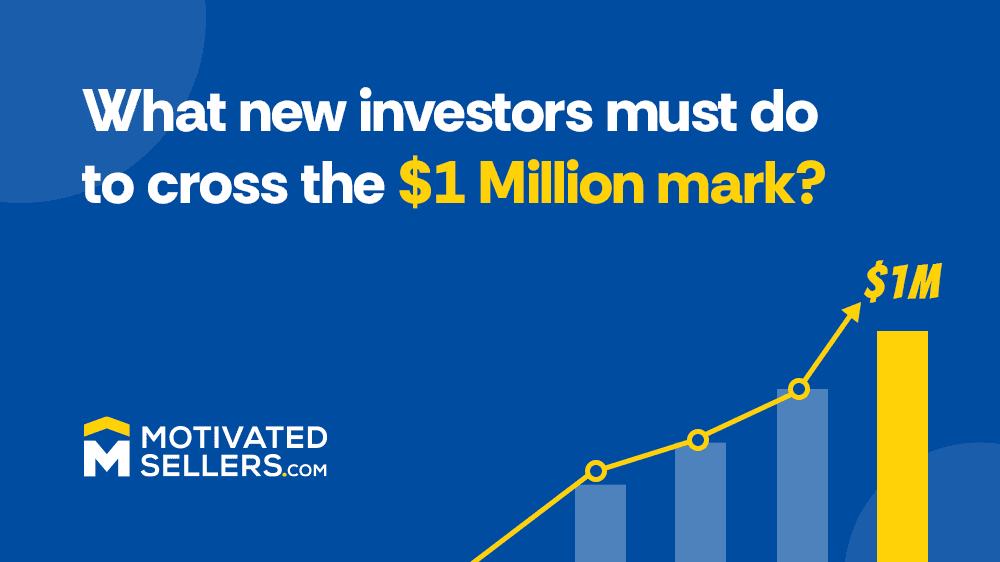

Success is never a matter of luck. It’s not a mystery. It’s always based on a series of repeatable moves that compound over time. In this guide, we’ll break down 11 proven steps real investors have used to go from zero to $1 million so you can see what it really takes to get there.
At Motivatedsellers.com, we work with over 2,000 real estate investors, and every successful investor has the same suggestion: you don’t have to reinvent the wheel. All the information, resources, and tips are available. You just have to find a good mentor and be a good student. The rest will fall into place.
Here’s the catch, though:
Mentorship is valuable only if you’ve built the foundation yourself. Invest in yourself through books, free content, and forums first, so that when you do reach out to mentors, the questions you ask are sharper and the relationships more useful. Here is the list of top recommended books for real estate investors.
You don’t need a mentor or community to learn your craft. A community offers accountability, real-time feedback, and access to insights and shortcuts you’ll never get from solo trial and error. For anyone starting from zero, you don’t need to have a deal under contract first.
What you do need is access to people who’ve walked the path, forums or local groups where people share wins and failures, and regular engagement so you aren’t stuck in analysis or fear.
Investing in real estate has the potential to make you wealthy, but there are risks involved. Natural disasters, economic conditions, and regulatory changes can flip the game. Are you ready for the struggles?
You cannot be successful in this risky market if you are not flexible enough to pivot and adjust after every adversity. That’s where your purpose keeps you going.
Your purpose will define your capacity for investment strategies, property selection, and risk management. For example, choose passive income streams (turnkey rentals or REITs) if you want freedom of time.
A successful wholesaler is not always a successful rehabber. Decide on one particular strategy and stick with it. Most beginning investors don’t choose a niche, and that’s the reason for years of struggle. Quite a few investors have noted that not choosing a niche led them to be distracted by shiny object syndrome. Common real estate niche options include:
As you master one city and one niche, you’ll gain a solid understanding of the numbers. You will learn market trends, valuation metrics, and operational nuances. You will also develop your brand identity, which will help attract investors, partners, and clients who align with that specific focus.
Hint: Most people begin with a niche because life gave them that opportunity. If that’s not the case, start with the easiest option. Consider getting a realtor license or trying house hacking. You can gradually move toward the next step.
Most new investors will need between 40 and 60 leads to close one deal. That’s a large volume, requiring consistent marketing effort. The best option is to choose a pay-per-lead system if you don’t have enough capital to run direct mail marketing campaigns. You can buy lists, drive for dollars, and negotiate directly with motivated sellers. You must also be aware of all restrictions regarding telecommunication marketing, such as the FCC consent rule.
Motivatedsellers.com also provides real-time, fresh, motivated seller leads. You can acquire the lead, follow up rigorously, and close deals without wasting time.
Scaling an investment business is impossible without having A-level players on your side. The difference between a one-off deal and a sustainable business often comes down to understanding KPIs and the strength of your team. Here is the team you will need at some point in your business:
Most cities in the U.S. will see some level of appreciation in property prices. Appreciation looks good, but it’s never guaranteed. It fluctuates with broader economic conditions, interest rates, and regional market cycles. Cash flow is a more reliable metric. Compare cash-on-cash return, cap rate, and internal rate of return (IRR), but give heavier weight to cash flow yield, especially in the early stages or during turbulent markets.
Hint: Always have a plan for exit or refinance. Know how you’ll extract equity if needed, whether by selling, cashing out, or raising capital. The investors we interviewed always look at all possible exit strategies when evaluating a deal.
Conservative underwriting gives you the cushion to protect against market downturns. Underwriting is the meticulous process of evaluating a property’s financial potential. You must understand various financial metrics and interpret them in the context of current market conditions.
Use stress-tested rent growth rates, budget for worst-case maintenance and insurance costs, and assume a projected vacancy rate even if your property management skills are exceptional.
If you speak with real estate investors, you will notice one pattern:
They all face failure at one stage or another. Some have lost multiple jobs, while others faced the recession of 2008. They all learned to navigate failure before success could be achieved.
Failure cannot and should not be avoided despite all the preparation. It’s a necessary part of the journey that helps you grow.
Successful investors rarely use their own cash to fund entire deals. You will need to tap into private money loans for a consistent supply of funds to finance your investments. Listen to this interview for a detailed conversation regarding private money.
Seller financing is also an option. Partnerships and joint ventures are also common. If you lack money, you can bring time, skills, or hustle to the table while a partner brings the capital. Many people have money sitting in savings or retirement accounts but don’t have investment knowledge. You can fill the gap.
As you take on more complex deals (bigger rehab, multifamily development, syndication), the knowledge, relationships, and expertise required also grow. What got you from zero to two properties won’t reliably get you from five to 50 units. Invest in yourself through coaching, better tools, mastermind groups, and networking to become a force multiplier.
Wealth comes from repeated, disciplined actions that compound over years. It’s not a one-time goal but a continuous process. Pace yourself to avoid burnout. Focus on developing reliable systems to create lasting results over the next 10, 20, or even 30 years. Real estate may offer immediate returns, but sustainable growth is achieved through long-term thinking and ongoing education.